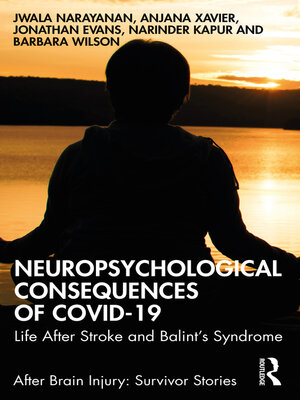Neuropsychological Consequences of COVID-19
ebook ∣ Life After Stroke and Balint's Syndrome
By Jwala Narayanan

Sign up to save your library
With an OverDrive account, you can save your favorite libraries for at-a-glance information about availability. Find out more about OverDrive accounts.
Find this title in Libby, the library reading app by OverDrive.



Search for a digital library with this title
Title found at these libraries:
| Library Name | Distance |
|---|---|
| Loading... |
Neuropsychological Consequences of COVID-19 focuses on Anjana's journey as a COVID survivor following a brain injury that left her with a very rare neuropsychological syndrome called Balint's syndrome, a disorder associated with difficulties in visual and spatial coordination. It is also the first book of its kind to provide a first-hand account from India on surviving brain injury, from diagnosis, recovery and rehabilitation, providing the therapeutic milieu in the Indian context and exploring cultural influences on rehabilitation.
Written jointly by Anjana, her neuropsychologist and the international experts in the field of neuropsychology who were also involved in her diagnosis and care, the book highlights how COVID-19, a virus primarily affecting the respiratory system, can also result in a disabling brain injury. It describes Anjana's recovery and the rehabilitation she received and provides a deeper understanding of this experience of a very rare condition through the views of Anjana herself. In addition, Anjana's rehabilitation journey stumbles upon many important themes of rehabilitation including cultural sensitivity, personal identity, resilience, role of family and rehabilitation in a low to middle income country.
This book is valuable reading for clinical and neuropsychologists, neurologists, other rehabilitation therapists including physiotherapists, occupational therapists, nurses and social work professionals, particularly those interested in cross cultural rehabilitation. It will also be of interest to students in these fields.







